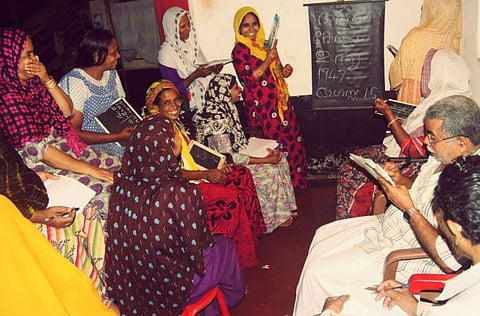

In June 2015, 101-year old Ayesha Beevi realised a dream which she had long lost hope in. Having lived for more than a century, the woman living in Kerala, was among the 2 lakh others from the state who have now completed education up to grade-4. Kerala is now all set to be declared the first state in the country to achieve what it categorized as complete primary education.
Beevi was one among 2,02,862 candidates who passed the exam conducted by the Kerala State Literacy Mission Authority’s (KSLMA) Athulyam scheme. Like her, 80% of the candidates who wrote the exam were above 50 years of age. The achievement comes 5 years after the Athulyam scheme was launched.
In 1989, the then Chief Minister EK Nayanar started the total literacy campaign, leading to a declaration in April 1991 that Kerala was the first totally literate state in the country. More than two decades after that, Vice President Hamid Ansari is expected to make this new declaration on January 13.
“We are delighted that there would be a declaration. According to UNESCO guidelines, if 90% population in a panchayat has attained primary school education, it is regarded as total,” Pradeep Kumar, spokesperson of KSLMA told The News Minute.
According to the Union Government, those who have completed grade-5 are considered to have completed primary education. Pradeep explains that in Kerala education up to grade-4 is regarded as primary education and so the announcement would be of ‘total primary education’. Despite the technicality, this is being seen as a major achievement.
How Kerala achieved this milestone
Kerala government’s first tryst with the mission to ensure every district administration works towards complete primary education can be dated back to 2007, when the Kiran project was launched in Kannur district.
More than 11,000 instructors took classes which were organized in libraries, schools and even in houses. More than 28,000 people in the 18-50 age group and around 47,000 people above 50 years of age enrolled themselves in the project. In August 2010, Kannur was declared as the first district in India to attain total primary education.
As Project Kiran gained success in Kannur, ‘Athulyam’ was started as a pilot project in 2006 in Nilambur and Chelambra panchayath in Malappuram district, and Payyanur Muncipality in Kannur district.
The success of the pilot project encouraged KSLMA to aim bigger. The first phase of Athulyam was launched in 2010 across 140 panchayats in all the constituencies in Kerala. Through extensive surveys, people living in these panchayats who had not yet completed their primary education or had dropped out of schools were traced. Convincing them to study again and sit for exams was the next step.
Four years later, the second phase was launched, but this time the plan was even more ambitious. KSLMA decided to target all panchayats across the state. The Social Welfare Department, after an extensive survey, identified 2,05,913 people who were eligible to write the Athulyam general exam titled ‘Athulyam Aksharolsavam’.
A whopping 1.7 lakh out of this were woman candidates. On June 7th, 2015, more than 2 lakh candidates wrote the exams at 6613 centres across the state, and this included more than 140 prison inmates from different jails in the state.
Candidates were also given the option of choosing Tamil or Kannada as their medium. When the valuation was complete, 98% of candidates passed in subjects including Malayalam, Mathematics, English and another one titled ‘We And our Surroundings'.
“This is a worthy reason for all Malayalees to feel proud and rejoice. To facilitate, sometimes with requests, motivations or with compulsion, the total population in the state to complete the 4th class was a Himalayan task. It is made possible thanks to the collective efforts of the various departments of the government, officials, volunteers, NGOs and friendly associations,” says a KSLMA statement.